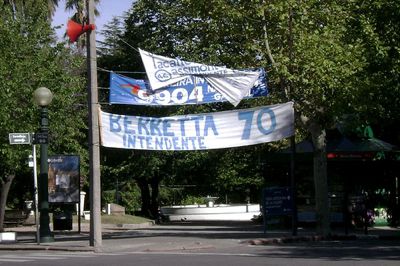Uruguay is experiencing, as it does every 5 years, an electoral process that will be decided on Sunday, October 25. However, if one candidate does not receive the majority of votes, then a run-off election will take place on the last Sunday in November. This is part of a busy 12 months in the electoral calendar in Uruguay, as “internal elections” or party elections took place last June, followed by the presidential elections, and municipal elections in May 2010.
There are many political parties in contention, but the list is reduced when referring to the parties that really have the chance to gain, at least one, parliamentary seat. These parties include the National Party (White Party), considered to be one of the traditional parties and is the main opponent of the current government. Others include the Broad Front, which is the current government, and is considered to left-leaning and can also be considered to be a “traditional” party, despite being a young party.

Photo of campaign propaganda in Colonia de Sacramento, Uruguay taken by Marisali and used under a Creative Commons license.
The major contenders for the presidential seat are considered to be the Broad Front and the National Party. One of the major candidates is already well-known to Uruguayans. Dr. Luis A. Lacalle, the National Party candidate, was President of Uruguay from 1999-2004 and is considered to be a major rival for the Broad Front.
On the other hand, their candidate is a very colorful figure, who is often seen far from typical political protocol or convention. José “El Pepe” Mujica has had a history with the National Liberation Movement “Tupamaros” in the 1960s, where he participated in guerrilla operations, arrested 4 times, and twice escaped from the Punta Carretas prison. In all, Mujica spent 15 years of his life in jail, with his last period of detention being between 1972-1985. When the military dictatorship ended, and democracy returned to the country, Mujica changed his weapons, and has been a deputy and a senator. In the current government, he was the Minister of Livestock and Agriculture.
The blogger Jorge Oyhenard takes a look at how various candidates are using the internet to spread their campaign [es]. He notes that most parties and candidates have their own website, but they have yet to maximize the use of web 2.0 and social networking sites.
With the stage set, there are few topics of discussion. Public security is a concern due to the wave of crime over the past few years, as well as the issue of taxes. However, the current campaign is already filled with usual campaign rhetoric as the blog Uy Elecciones [es] describes:
Si un marciano encayara en Uruguay (podría ser en otros muchos países) y lee los programas de gobierno de los (o escucha a los) diferentes partidos políticos se encontraría con una grata sorpresa: a todos ahora les importa la justicia social (planes para ayudar a los más desfavorecidos, educación y salud más equitativas, etc.), alguna que otra cosa del medio ambiente, los beneficios para los pasivos (y si, hay que nombrarlos que cada vez son más), la transparencia (a esta altura ésta podría ser ya una política de Estado, todos la apoyan (que bueno, no?)).
Y así estamos; esas “semejanzas” condimentadas con la publicidad medio-masiva moderna electoral crean como una nube gris, en la cual es comprensible caer en la de “son todo lo mismo”.







3 comments
Im from Uruguay and just wanted to correct one little thing… Luis Alberto Lacalle was president from 1990 to 1995, Julio Sanguinetti followed from ’95 to 2000 and Jorge Batlle from 2000 to 2005, 2005 to this date Tabaré Vázques is our president…